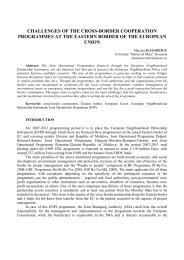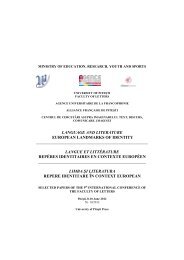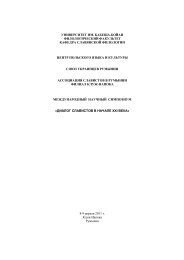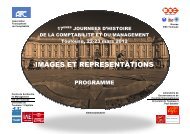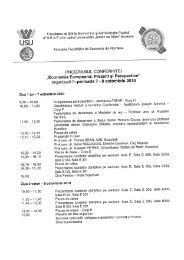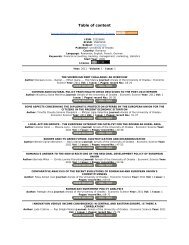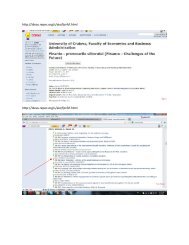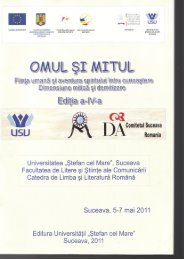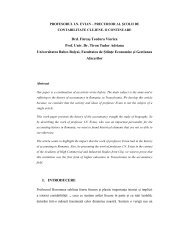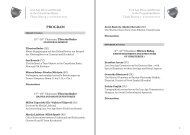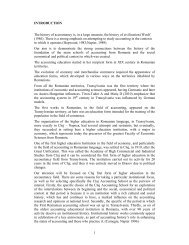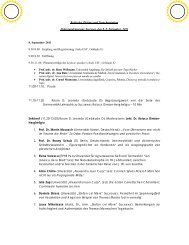Hume on miracles and the Lourdes phenomenon Alexandru Anghel
Hume on miracles and the Lourdes phenomenon Alexandru Anghel
Hume on miracles and the Lourdes phenomenon Alexandru Anghel
You also want an ePaper? Increase the reach of your titles
YUMPU automatically turns print PDFs into web optimized ePapers that Google loves.
We must pay attenti<strong>on</strong> to <strong>the</strong> human factor of this equati<strong>on</strong>, <strong>the</strong> subjective filter of <strong>the</strong><br />
testim<strong>on</strong>y being an extreme important <strong>on</strong>e. The objectivity of <strong>the</strong> witnesses is present in different<br />
degrees <strong>and</strong>, in c<strong>on</strong>trast with subjectivity, it is never entirely present. Witnesses tend to be biased<br />
by different factors that pertain to educati<strong>on</strong>, beliefs (religious or o<strong>the</strong>rwise), prejudices, group<br />
pressure, perceptual impairment, etc.<br />
reported:<br />
(2) The sec<strong>on</strong>d method suggested by <str<strong>on</strong>g>Hume</str<strong>on</strong>g> is c<strong>on</strong>cerned with <strong>the</strong> nature of <strong>the</strong> event<br />
Suppose, for instance, that <strong>the</strong> fact, which <strong>the</strong> testim<strong>on</strong>y endeavours to establish,<br />
partakes of <strong>the</strong> extraordinary <strong>and</strong> <strong>the</strong> marvellous; in that case, <strong>the</strong> evidence, resulting from <strong>the</strong><br />
testim<strong>on</strong>y, admits of a diminuti<strong>on</strong>, greater or less, in proporti<strong>on</strong> as <strong>the</strong> fact is more or less<br />
unusual. The reas<strong>on</strong> why we place any credit in witnesses <strong>and</strong> historians, is not derived from any<br />
c<strong>on</strong>nexi<strong>on</strong>, which we perceive a priori, between testim<strong>on</strong>y <strong>and</strong> reality, but because we are<br />
accustomed to find a c<strong>on</strong>formity between <strong>the</strong>m. But when <strong>the</strong> fact attested is such a <strong>on</strong>e as has<br />
seldom fallen under our observati<strong>on</strong>, here is a c<strong>on</strong>test of two opposite experiences; of which <strong>the</strong><br />
<strong>on</strong>e destroys <strong>the</strong> o<strong>the</strong>r, as far as its force goes, <strong>and</strong> <strong>the</strong> superior can <strong>on</strong>ly operate <strong>on</strong> <strong>the</strong> mind by<br />
<strong>the</strong> force, which remains. The very same principle of experience, which gives us a certain degree<br />
of assurance in <strong>the</strong> testim<strong>on</strong>y of witnesses, gives us also, in this case, ano<strong>the</strong>r degree of<br />
assurance against <strong>the</strong> fact, which <strong>the</strong>y endeavour to establish; from which c<strong>on</strong>tradicti<strong>on</strong> <strong>the</strong>re<br />
necessarily arises a counterpoise, <strong>and</strong> mutual destructi<strong>on</strong> of belief <strong>and</strong> authority (<str<strong>on</strong>g>Hume</str<strong>on</strong>g>,<br />
[1748]2007:113).<br />
Thus, <strong>the</strong> certainty of <strong>the</strong> testim<strong>on</strong>y will vary proporti<strong>on</strong>ally to <strong>the</strong> degree of probability<br />
of <strong>the</strong> event that <strong>the</strong> testim<strong>on</strong>y attempts to establish. The higher <strong>the</strong> degree of improbability <strong>the</strong><br />
more extraordinary or marvelous <strong>the</strong> event is. In this situati<strong>on</strong> we d<strong>on</strong>’t take into account <strong>the</strong><br />
testim<strong>on</strong>y given in behalf of <strong>the</strong> reported event; we d<strong>on</strong>’t c<strong>on</strong>sider <strong>the</strong> pers<strong>on</strong> or <strong>the</strong> written text<br />
that testifies. We <strong>on</strong>ly evaluate <strong>the</strong> claim in itself.<br />
An event can be extraordinary or marvelous, but that doesn’t make it a miraculous event.<br />
The latter is not c<strong>on</strong>formable to our past experience, which represents a proof in itself: A miracle<br />
is a violati<strong>on</strong> of <strong>the</strong> laws of nature (<str<strong>on</strong>g>Hume</str<strong>on</strong>g>, [1748]2007:114) 4 . A miraculous event, in order to be<br />
4 It seems that <str<strong>on</strong>g>Hume</str<strong>on</strong>g>’s argument could be avoided if we refused to accept this definiti<strong>on</strong>, <strong>and</strong> say that God or any<br />
o<strong>the</strong>r agent could perform <strong>miracles</strong> without having to breach any natural law; that a miracle is worked out by purely<br />
natural laws which are yet unknown to us <strong>and</strong> that a miracle is a very normal happening. But this perspective



